By providing an email address. I agree to the Terms of Use and acknowledge that I have read the Privacy Policy .

Bongbong Marcos arrives in Japan for five-day official visit
TOKYO, Japan — President Ferdinand “Bongbong” Marcos Jr. has arrived in Japan for a five-day state visit to one of the Philippines’ longtime and most important allies.
Marcos arrived on Wednesday at exactly 5:36 pm (Tokyo time) at the Tokyo International Airport.
The Chief Executive’s entourage meanwhile includes First Lady Liza Araneta-Marcos, key members of the Cabinet, and several leading lawmakers like Senate President Juan Miguel Zubiri, House Speaker and Leyte 1st District Rep. Ferdinand Martin Romualdez, and Senior Deputy Speaker and Pampanga 2nd District Rep. Gloria Macapagal-Arroyo.
Marcos’ state visit to Japan is seen to have a huge bearing on economic development and mutual defense, as the Department of Foreign Affairs (DFA) previously announced that seven bilateral deals are expected to be signed by the two governments.
Aside from infrastructure and defense, the other agreements include topics concerning agriculture and information and communications technology.
READ: DFA: 7 key bilateral deals to be inked during Marcos’ visit to Japan
A business delegation would also accompany Marcos in meetings expected while the President is in Tokyo — discussions that seek to direct investments toward the Philippines.
Marcos is expected to meet members of Japan’s Imperial Family before having discussions with Japanese Prime Minister Fumio Kishida.
While this is Marcos’ first official visit to Japan as the Philippines’ sitting President, DFA said he and Kishida have already met on the sidelines of the United Nations General Assembly (UNGA) in New York, United States held last September 2022.
After this, the President would also have a chance to meet the Filipino community in Japan, as he has done on previous trips.
Marcos’ visit to Japan is his ninth official overseas trip since he assumed the presidency last June 30. Prior to this, the President went to Indonesia and Singapore for his inaugural state visit and then headed to New York for the UNGA.
He also went back to Singapore for business meetings in time for the Formula One Grand Prix, a trip that was criticized by several progressive groups.
READ: Palace: Marcos’ Singapore trip for F1 race ‘productive’
Subscribe to our daily newsletter
He then went to the 40th and 41st Association of Southeast Asian Nations (Asean) Summit in Cambodia , the Asia-Pacific Economic Cooperation summit in Thailand, the Asean-European Union meet in Belgium last December, before visiting China for another state visit, and Switzerland for the World Economic Forum.
READ: Davos will be Marcos’ 8th foreign trip in under 7 months
Subscribe to our global news
Disclaimer: Comments do not represent the views of INQUIRER.net. We reserve the right to exclude comments which are inconsistent with our editorial standards. FULL DISCLAIMER
© copyright 1997-2024 inquirer.net | all rights reserved.
We use cookies to ensure you get the best experience on our website. By continuing, you are agreeing to our use of cookies. To find out more, please click this link.
- Subscribe Now
Marcos to visit Japan in February
Already have Rappler+? Sign in to listen to groundbreaking journalism.
This is AI generated summarization, which may have errors. For context, always refer to the full article.
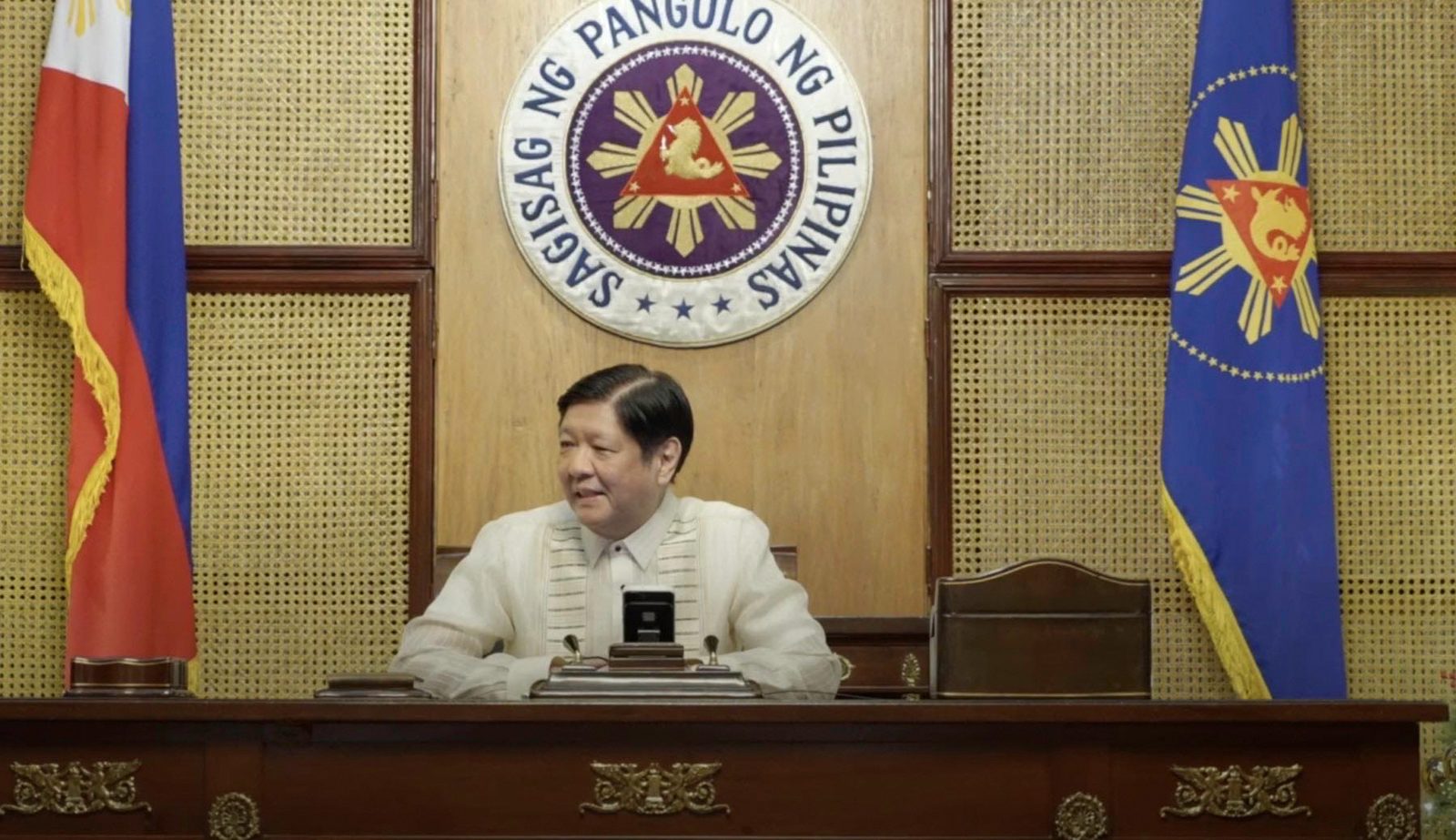
OFFICIAL VISIT. PBBM congratulates Malaysian PM Anwar Ibrahim during a telephone call.
Office of the Press Secretary
MANILA, Philippines – Following a state visit to China that was quick but packed with meetings, President Ferdinand Marcos Jr. is going to another Asian superpower: Japan.
Marcos confirmed that he is set to make a state visit to Japan “around the second week of February.”
The Philippine president first met with Japanese Prime Minister Fumio Kishida in New York in September 2022 on the sidelines of the United Nations General Assembly. Kishida was the first head of government that Marcos met after his state visits to Indonesia and Singapore.
But before visiting Japan in February, Marcos will fly to Davos in Switzerland in late January to attend the World Economic Forum.
Marcos said “economic security” and regional security issues will likely be on the agenda when he visits Tokyo, jumping off his meeting with Kishida in September 2022.
“The Philippines is seen as an important part of maintaining that security in partnership with friends and partners like Japan and the other countries around the Indo-Pacific, Asia-Pacific region,” said Marcos in an interview with media in Beijing.
Marcos has traveled to seven countries since assuming office in end-June 2022. He has been to Indonesia, Singapore, the US, Cambodia, Thailand, Belgium, and China. – Rappler.com
Add a comment
Please abide by Rappler's commenting guidelines .
There are no comments yet. Add your comment to start the conversation.
How does this make you feel?
Related Topics

Recommended Stories
{{ item.sitename }}, {{ item.title }}, ferdinand marcos jr., remulla directs nbi to probe marcos deepfake audio ordering military attack.
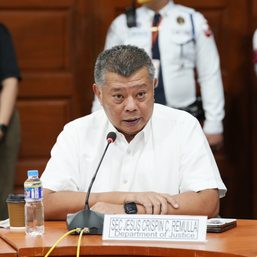
Marcos extends service of gov’t contractual workers to December 2025
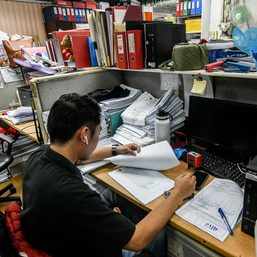
[OPINION] If it’s Tuesday it must be Belgium – travels make over the Marcos image
![pbbm japan state visit [OPINION] If it’s Tuesday it must be Belgium – travels make over the Marcos image](https://www.rappler.com/tachyon/2024/04/tl-travel-makeovers-marcos-image.jpg?resize=257%2C257&crop_strategy=attention)
Malacañang sounds alarm over Marcos deepfake audio | The wRap
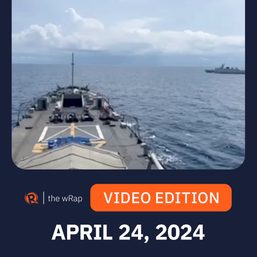
Marcos urged to make ‘explicit’ order stopping bloody drug war

Fumio Kishida
Us, japan, ph express ‘serious concern’ over china actions in ayungin shoal, senkaku islands .
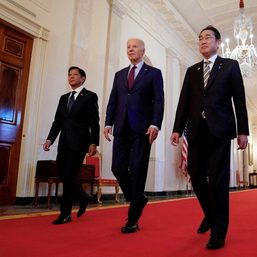
PH, US, Japan coast guards to hold exercises, patrol in Indo-Pacific
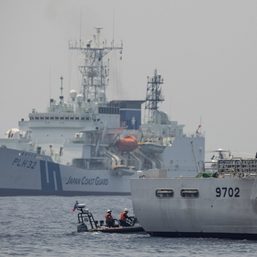
Biden and Japan’s Kishida forge new partnership, eyeing China and Russia
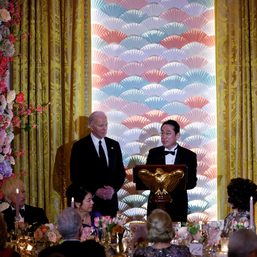
Marcos to fly to Washington DC in April for US-Japan-PH trilateral summit
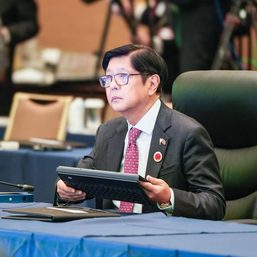
Japan PM Kishida to discuss AI with Meta’s Zuckerberg on February 27 – report
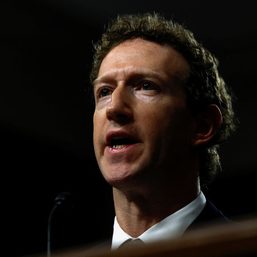
Wishing for surot-free airport sofas like these
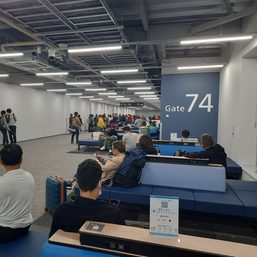
Philippines, Japan eye signing of reciprocal troops pact within 2024 – Malaya
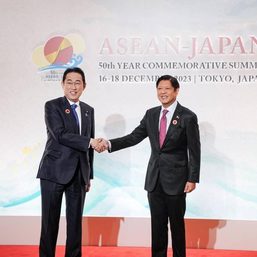
FACT CHECK: US, Canada, Japan, Australia, and Germany have not ‘joined forces’ in the Philippine Sea
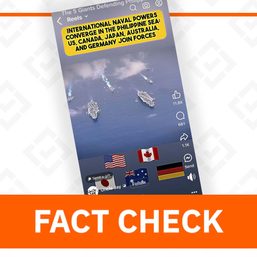
US, Japan, Philippines trilateral deal to change dynamic in South China Sea, Marcos says
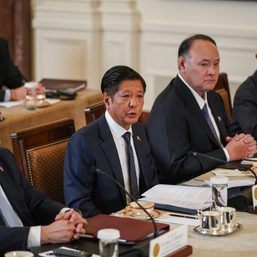
China summons Japanese, Philippine diplomats over negative comments
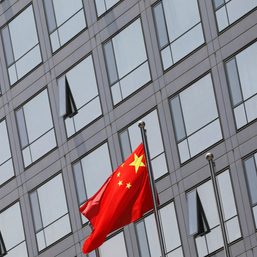
Checking your Rappler+ subscription...
Upgrade to Rappler+ for exclusive content and unlimited access.
Why is it important to subscribe? Learn more
You are subscribed to Rappler+
- About Malaya Business Insight
- Advertisements
- 41st Anniversary Supplement
- 40th Anniversary Supplement
- 39th Anniversary Report
- 38th Anniversary Report
- Banking And Finance
- Market Markers
- Corporate Roundup
- Shipping And Transportation
- International
- Motorsports
- Banking & Finance
- Infotech & Electronics
- Travel & Tourism
- Environment
- Supplements
- Marketing Board
- Entertainment
- Opinion of the day
- Column of the day
- Search for: Search Button

PRESIDENT Marcos Jr. is set to go on an official visit to Japan on February 8 to 12 during which at least seven key agreements between Manila and Tokyo will be signed along with several business deals, the Department of Foreign Affairs (DFA) said yesterday.
The trip, according to DFA Assistant Secretary for Asian and Pacific Affairs Neal Imperial, is expected to reaffirm strong relations between the Philippines and Japan.
It will be Marcos’ first visit to Japan, since becoming president, and his second face-to-face-meeting with Japanese Prime Minister Fumio Kishida whom he met last year on the sidelines of the United Nations General Assembly in the United States.
Marcos’ visit to Japan, his third since the start of the year and his 10th since becoming president, is on the invitation of the Japanese prime minister.
“The official working visit is expected to reaffirm the strong and vibrant relations between the two countries. It also seeks to maximize the full potential of PH-Japan strategic partnership in all its aspects and facilitate closer defense, security, political, economic, and people to people ties,” Imperial said.
Imperial said Japan is the only country with which the Philippines has a free trade agreement, or the Japan-Philippines Economic Partnership Agreement.
Japan is the country’s second largest trading partner, the third largest export market of the country, and second top source of imports.
Imperial said seven key bilateral documents or agreements covering cooperation in infrastructure development, defense, agriculture and information and communications technology between the two countries will be signed during the visit on top of several business deals.
Asked to elaborate on the key agreements, Imperial said the Department of National Defense and the Ministry of Defense of Japan will sign the “umbrella terms of reference” on humanitarian assistance and disaster relief cooperation, and exchange of notes about a $3billion loan agreements on infrastructure projects such as the North-South Commuter Railway from Malolos in Bulacan to Tutuban in Manila and the North-South Commuter Railway Extension from Malolos to Clark International Airport, and from Tutuban to Calamba in Laguna.
He did not elaborate on the proposed memorandum of cooperation in the field of information and communications technology, and on agriculture but expressed hope that the visit will result in more exports of agricultural products to Japan especially bananas and avocado.
The President will also meet with Emperor Naruhito and Empress Masako.
He will also have “roundtable” business meetings and forums on February 9 and 10, including one with chief executive officers of Japanese shipping companies and associations, which is expected to enhance the global competitiveness of Filipino seafarers and advance partnerships on maritime education and welfare programs for Filipino seafarers.
Marcos will also meet with members of the Filipino community in Tokyo before he returns to Manila.
Imperial said he does not expect the Japan trip to be affected by issues about Filipino comfort women during World War II and about four Japanese fugitives detained in the Philippines. He said case of the fugitives who Japan want deported is a matter now being handled by the Department of Justice and Japan’s Ministry of Justice.
“We don’t think it will affect, in any way, the visit of the President and we do not expect it to be raised during his meeting with counterpart,” he said.
Marcos will be joined in the five-day Japan trip by a “large business delegation,” Imperial said, together with First Lady Louise “Lisa” Marcos, former president and now Pampanga Rep. Gloria Macapagal-Arroyo, Senate President Juan Miguel Zubiri, Speaker Martin Romualdez, Foreign Affairs Secretary Enrique Manalo, Finance Secretary Benjamin Diokno, Trade Secretary Alfredo Pascual, Energy Secretary Rafael Lotilla, Tourism Secretary Cristina Frasco, Presidential Communications Secretary Cheloy Garafil, and Special Assistant to the President Antonio Lagdameo Jr.
UK police arrest three over migrants’ deaths in Channel
Nfa buys palay at higher prices, areit seen retaining 97% occupancy rate, japan’s corporate inflation up, milk tea giant unveils another pick-me-up, dfa: state dep’t assessment of rights situation misleading.


Marcos disclosed that tentatively he will be in Japan for a state visit in the second week of February.
"I think the tentative date is around the second week of February, right now," he said during an interview with media before leaving Beijing, China on Thursday, Jan. 5.
The President said he immediately accepted the invitation to visit Japan when he met with the Prime Minister Kishida in New York at the sidelines of the UN General Assembly meeting.
He also said that the Philippine government is "now talking" to the Japanese foreign service "as to when would be the most suitable time to come."
During his visit, Marcos is expected to further discuss the matters they discussed in New York in September last year such as regional security concerns and economic security.
"Well, the agenda will be what we --- will be a continued discussion of what we started in New York which essentially centers around economic security because with the --- Japanese have many concerns about regional security and we are seen, of course, the Philippines is seen as an important part of maintaining that security in partnership with friends and partners like Japan and the other countries around the Indo-Pacific, Asia-Pacific region," he said.
The chief executive said they will also talk about matters concerning aid and grants.
Before flying to Japan, he will be going to Davos, Switzerland to participate in the World Economic Forum later this month.
You are using an outdated browser. Please upgrade your browser to improve your experience.

Please select region
- National Capital Region
- Cordillera Administrative Region
- Ilocos Region
- Cagayan Valley
- Central Luzon
- Bicol Region
- Western Visayas
- Central Visayas
- Eastern Visayas
- Zamboanga Peninsula
- Northern Mindanao
- Davao Region
- SOCCSKSARGEN
- Caraga Region
PBBM arrives in US for trilateral meeting with Japan, US

No. of Shares:
Currently viewed by: Marcus Rosit
- Press Releases
- by Andrea Bancud
- Apr. 11, 2024 8:48 am in Press Releases
MANILA -- President Ferdinand R. Marcos Jr. arrived in Washington, DC Wednesday night (US time) along with members of the Philippine delegation for the trilateral meeting with the United States and Japan.
The plane carrying President Marcos arrived at around 7:47pm pm at John Base Andrews in Maryland where he was warmly welcomed by Philippine Embassy and US officials.
President Marcos is embarking on a two-day working visit, mainly for the trilateral meeting with US President Joe Biden and Japanese Prime Minister Fumio Kishida to enhance the economic and maritime cooperation of the three countries.
Before leaving Manila, President Marcos said his visit to the US will build upon his previous meetings with Prime Minister Kishida and US Vice President Kamala Harris in September last year in Jakarta, Indonesia.
President Marcos said he also intends to explore ways of advancing cooperation, especially in the areas of critical infrastructure, semiconductors, digitalization and cybersecurity, among others.
The chief executive will also meet with business leaders in the US to invite them to invest in the Philippines. (PND)
- trilateral meeting with the United States and Japan
- economic and maritime cooperation
About the Author
Andrea Bancud
Information II from the Creative Production Services Division of PIA Central Office who also writes scripts for IEC materials such as AVP, TV Commercial, Radio Commercial and print materials.
Related Articles
Related news.
- Most Viewed
- Trending Features
- Archived Features
Feedback / Comment
Get in touch, philippine information agency.
The Philippine Information Agency is the official public information arm of the Government of the Republic of the Philippines. The PIA works with the Office of the President, national government agencies, and other public sector entities in communicating their programs, projects, and services to the Filipino people. The agency has a regional office in all 16 regions and has an information center in 78 provinces across the Philippines.
Government Links
- The President
- Presidential Communications Office
- APO Production Unit, Inc.
- Bureau of Communications Services
- Freedom of Information
- People's Television Network, Inc.
- Philippine Broadcasting Services
- Philippine News Agency
- Presidential Broadcast Staff - Radio Television Malacañang
- Office of the Vice President
- Supreme Court
- Senate of the Philippines
- House of Representatives
+63 2 8 926 5129


Republic of the Philippines
All content is in the public domain unless otherwise stated.

- Published on: 02/07/2023
- | Section: Top Stories
Albee joining PBBM Japan state visit
• GILBERT P. BAYORAN
Bacolod City Mayor Alfredo Abelardo Benitez yesterday said that he will be joining President Ferdinand Marcos Jr. in his state visit to Japan on February 8.
Duplicating what he did in the state visit of President Marcos in China, Benitez said he will look for investments, especially in the field of tourism, manufacturing and Information Technology for Bacolod City.
Last week, officials of Jiangsu Fengchuen New Energy Power Technology Co. Ltd. visited Bacolod City, and met with Benitez, to discuss their proposal to build USD200 million (P10 billion) electric vehicle manufacturing plant in the city.
This was a follow up to initial discussions between Benitez and officials of the Jiangsu Fengchuen New Energy Power Technology Co. Ltd, when he accompanied President Marcos Jr. during his state visit to China.
The visit of Pres. Marcos Jr. in Japan from Feb. 8 to 12, will be his third foreign trip this year, after a state visit to China and participation at the World Economic Forum in Switzerland in January.
The Department of Foreign Affairs (DFA) said it considers Marcos’ visit to Japan “consequential,” with seven bilateral key agreements expected to be signed on top of business deals, including areas of infrastructure development, defense, agriculture, and information and communications technology.*
Read Article by date
- PDP Laban members in Victorias resign
- Silay solar project faces dust problem
- AFP Visayas Command gets new head
- NPA claims woman’s death in Kabankalan
- Bacolod SP urges participation in Cervical Cancer Awareness Month
- Himamaylan provides aid to octogenarian fire victim
- NEA sacks NOCECO officials
- Blue alert raised in Negros, Panay due to El Niño
- Octogenarian found dead, 2 injured in explosion
- Cops nab 1,501 wanted persons in Region 6
- ‘Ite, missa est’
- Greater threats
- Some notes on preaching God’s word
- Favoring importers?
- When we fail to practice what we preach
- Trimming the Party List
- Always listen to the promptings of the Holy Spirit
- Infinite dignity
- Still dangerous
- Temple hosts art exhibit on ‘Transcendence’
- E. B. Magalona holds Earth Day coastal cleanup
- ‘Catharsis of Creativity’ opened at Gallerie G
- TNM hosts female Korean artists
McDonald’s launches app campaign in Bacolod City
- PSA, BCNHS Class of 1999 collaborates to give back to students
- Aspiring vet crowned Lin-ay sang Negros 2024
- The weekend at Panaad sa Negros…
AABN mounts simultaneous Panaad exhibits
- Cadiz folk dancers top Panaad competition

Mountainous DSB hosts beach volleyball tourney

Globe goes after SIMs engaged in spam and scams

Mundial de Futbol players eye Makati City tiff

WVRAA ready for kick off in Negros Occidental

Get your copy of the Visayan Daily Star everyday!
Avail of the FREE 30-day trial.
PBBM slated to visit Japan this February 2023
Philippine President Ferdinand “Bongbong” Marcos Jr. has announced that he will be visiting Japan in February, after accepting an invitation extended by Japanese Prime Minister Fumio Kishida during their meeting at the United Nations General Assembly in New York last September.
The tentative date for the visit is set for the second week of February, and it will center around discussions on economic security.
“We are now talking to the Japanese authorities, to Japanese foreign service as to when will be the most suitable time for me to come. I think the tentative date is around the second week of February,” said Marcos.
“The agenda will be a continued discussion of what we started in New York, which essentially centers around economic security. The Japanese have many concerns about regional security, and the Philippines is seen as an important part of maintaining that security in partnership with friends and partners like Japan and the other countries in the Indo-Pacific and Asia-Pacific regions,” he added.
Asked about the agenda of the visit, Marcos said it would center on economic security. Grants and aid may also be discussed as well.
Prior to his trip to Japan, President Marcos will attend an economic forum in Davos, Switzerland later this month. This marks the first official visit by a Philippine president to Japan in eight years. The two countries have a longstanding relationship, with Japan being one of the Philippines’ top trading partners and a major source of foreign investment. The visit is expected to further strengthen the already close ties between the two nations.
Staff Report
Related articles.

A Visual Tour of Rockwell Land’s Condominium Project in Quezon City – 8 Benitez

Upgrading Your Assets: Your Guide to Investing in Premium Condominiums in the Philippines

One more week: Dubai’s Global village extends season 28
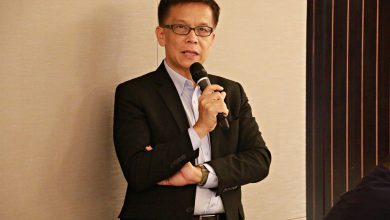
Marcos appoints Cacdac as new DMW Secretary
Privacy overview.

SMNI NEWS CHANNEL
TRUTH THAT MATTERS
PBBM in Czech Republic for his four-day state visit

PRESIDENT Ferdinand R. Marcos Jr. arrived at Vaclav Havel International Airport on Wednesday afternoon (local time) for his four-day state visit to the Czech Republic.
The plane carrying President Marcos and First Lady Louise Araneta-Marcos landed at the airport at 5:43 pm local time or 12:43 am Manila time, accompanied by members of the Philippine delegation.
Marcos is expected to hold meetings with Czech Republic President Petr Pavel during his visit as well as three other constitutional heads of government, including Czech Republic Prime Minister Petr Fiala, Senate President Miloš Vystrčil, and Chamber of Deputies Speaker Markéta Pekarová Adamová.
It is expected that a Joint Communiqué will be signed to establish labor consultation mechanisms, aiming to enhance cooperation between the Philippines and the Czech Republic.
This is for the safe and orderly migration of Filipino workers and to provide a higher level of protection for their rights and welfare.
Both nations will commemorate their 50th bilateral relations anniversary since its establishment on October 5, 1973.
To recall, President Marcos visited other countries— prior to this trip to Germany and the Czech Republic, he visited Melbourne, Australia, to attend the ASEAN-Australia Special Summit from March 4-6.
From February 28 to 29, PBBM also traveled to the Australian capital of Canberra.
Follow SMNI NEWS in Twitter
Follow SMNI News on Rumble
You May Like This --

Pastor Apollo C. Quiboloy, celebrates his birthday in Brazil

Pastor Apollo C. Quiboloy, celebrates his birthday in Fung Leng Ouvidor Ariaga, Macau

Pastor Apollo C. Quiboloy, celebrates his birthday in Taiwan

COVID-19 cases surge in Thailand after Songkran festivities

COVID-19, sanhi ng pagbaba ng life expectancy ng tao ayon sa isang pag-aaral

Alpha at Delta COVID-19 variants, “extinct” na sa Pilipinas—DOH

COVID-19, “major threat” pa rin—WHO

On circulating messages regarding false claim of new COVID-19 wave in Metro Manila

DOH, walang nakikitang COVID-19 surge matapos ang pagdiriwang ng Pasko at Bagong Taon

Kaso ng COVID-19, tataas pa matapos ma-detect ang JN.1 subvariant—DOH
Privacy overview.
Mobile Menu Overlay
The White House 1600 Pennsylvania Ave NW Washington, DC 20500
United States-Japan Joint Leaders’ Statement
Global Partners for the Future
Over the course of the last three years, the U.S.-Japan Alliance has reached unprecedented heights. We arrived at this historic moment because our nations, individually and together, took courageous steps to strengthen our collective capacity in ways that would have seemed impossible just a few years ago. Today, we, President Joseph R. Biden, Jr. and Prime Minister KISHIDA Fumio, celebrate this new era of U.S.-Japan strategic cooperation during the Prime Minister’s Official Visit and State Dinner in Washington, D.C.—and pledge that the United States and Japan will continue our tireless work, together and with other partners, to realize a free and open Indo-Pacific and world.
In this new era of U.S.-Japan cooperation, we recognize that global events affect the security and stability of the Indo-Pacific, and that developments in our shared region reverberate around the world. We are therefore working together, across all domains and at all levels, to build a global partnership that is fit for purpose to address the complex, interconnected challenges of today and tomorrow for the benefit of our two countries and the world. As our Alliance cooperation reaches new heights, we are expanding our engagement to reflect the global nature of our partnership.
At the core of our cooperation is a shared commitment to work with like-minded partners and multilateral institutions to address common challenges and to ensure a world that is free, open, connected, resilient, and secure. These joint efforts are based on our shared fundamental respect for international law, including the protection and promotion of human rights and dignity, the sovereignty and territorial integrity of all states, and the prohibition on acquisition of territory by force. Our purpose as partners is to uphold and bolster the free and open international order based on the rule of law that has allowed so many nations to develop and prosper, and to ensure our Alliance is equipped to tackle the challenges of the 21 st century.
To advance our global partnership, today we announce several new strategic initiatives to strengthen our defense and security cooperation; reach new frontiers in space; drive technology innovation; bolster economic security; accelerate climate action; partner on global diplomacy and development; and fortify the ties between our peoples. Through our global partnership, we are also synchronizing our strategies, and our two nations have never been more united as we work together to address the most pressing challenges and opportunities of the future.
Strengthening our Defense and Security Cooperation
The core of our global partnership is our bilateral defense and security cooperation under the Treaty of Mutual Cooperation and Security, which is stronger than ever. We affirm that our Alliance remains the cornerstone of peace, security, and prosperity in the Indo-Pacific. President Biden reiterated the unwavering commitment of the United States to the defense of Japan under Article V of the Treaty, using its full range of capabilities, including nuclear capabilities. Prime Minister Kishida reaffirmed Japan’s unwavering commitment to fundamentally reinforce its own defense capabilities and roles, and to enhance its close coordination with the United States under the Treaty.President Biden also reaffirmed that Article V applies to the Senkaku Islands. We reiterated our strong opposition to any attempts by the People’s Republic of China (PRC) to unilaterally change the status quo by force or coercion in the East China Sea, including through actions that seek to undermine Japan’s longstanding and peaceful administration of the Senkaku Islands. We welcome the progress in optimizing Alliance force posture in areas including the Southwestern Islands to strengthen U.S.-Japan deterrence and response capabilities, and we confirm the importance of further advancing this initiative.
The United States welcomes the steps Japan is taking to fundamentally enhance its defense capabilities, including its plans to increase the budget for its defense capabilities and complementary initiatives to two percent of GDP in Japanese Fiscal Year (JFY) 2027 in accordance with Japan’s National Security Strategy, its decision to possess counterstrike capabilities, and its plans to stand up the Japan Self-Defense Forces (JSDF) Joint Operations Command to enhance command and control of the JSDF. Together, these initiatives elevate our defense ties to unprecedented levels and launch a new era of U.S.-Japan security cooperation, strengthening our Alliance and contributing to stability in the Indo-Pacific.
Today, we announce several new strategic initiatives to further advance our Alliance. Recognizing the speed at which regional security challenges evolve and to ensure our bilateral Alliance structures meet these critical changes, we announce our intention to bilaterally upgrade our respective command and control frameworks to enable seamless integration of operations and capabilities and allow for greater interoperability and planning between U.S. and Japanese forces in peacetime and during contingencies. More effective U.S.-Japan Alliance command and control will strengthen deterrence and promote a free and open Indo-Pacific in the face of pressing regional security challenges. We call on our respective defense and foreign ministries to develop this new relationship through the Security Consultative Committee (our security “2+2”). In support of this vision, we also reaffirm our goal to deepen Intelligence, Surveillance, and Reconnaissance cooperation and Alliance information sharing capabilities, including through the Bilateral Information Analysis Cell.
We will also continue to implement efforts to strengthen our Alliance force posture, build high-end base capabilities, and increase preparedness that are necessary to deter and defend against threats. We resolve to deepen bilateral cooperation toward the effective development and employment of Japan’s suite of counterstrike capabilities, including the provision of U.S. materiel and technological support to enhance Japan’s indigenous stand-off programs. The United States expressed its commitment to start the training pipeline and ship modifications for Japan to acquire operational capability of the Tomahawk Land Attack Missile (TLAM) system. We also reaffirmed our pursuit of a Glide Phase Interceptor (GPI) cooperative development program to counter high-end, regional hypersonic threats.
As our countries strengthen our bilateral ties, we will continue to build our relationships with like-minded partners in the region. Today, we announce our vision to cooperate on a networked air defense architecture among the United States, Japan, and Australia to counter growing air and missile threats. Recognizing Japan’s strengths and the close bilateral defense partnerships with the AUKUS countries, AUKUS partners – Australia, the United Kingdom, and the United States – are considering cooperation with Japan on AUKUS Pillar II advanced capability projects. Continuing the momentum from the Camp David Summit, we welcome progress on establishing an annual multidomain exercise between the United States, Japan, and the Republic of Korea (ROK). Recognizing the commitments made in the Atlantic Declaration and the Hiroshima Accord, and as the Indo-Pacific and Euro-Atlantic regions become ever more interlinked, we welcome the announcement of regular U.S.-Japan-UK trilateral exercises, beginning in 2025, as we enhance our shared and enduring security. Building on the announcement at the Australia Official Visit in October to pursue trilateral cooperation with Japan on unmanned aerial systems, we are exploring cooperative opportunities in the rapidly emerging field of collaborative combat aircraft and autonomy.
The United States welcomes Japan’s revision of the Three Principles on the Transfer of Defense Equipment and Technology and its Implementation Guidelines, which bolsters cooperation through joint development and production to enhance our deterrence capabilities in the region. To leverage our respective industrial bases to meet the demand for critical capabilities and maintain readiness over the long term, we will convene a Forum on Defense Industrial Cooperation, Acquisition and Sustainment (DICAS) co-led by the U.S. Department of Defense and Japan’s Ministry of Defense to identify priority areas for partnering U.S. and Japanese industry, including co-development and co-production of missiles and co-sustainment of forward-deployed U.S. Navy ships and U.S. Air Force aircraft, including fourth generation fighters, at Japanese commercial facilities, in coordination with relevant ministries. This forum, in conjunction with our existing Defense Science and Technology Cooperation Group, will better integrate and align our defense industrial policy, acquisition, and science and technology ecosystems. The DICAS will provide updates on progress to the foreign and defense ministers in the security “2+2.” We also commit to establishing a working group to explore opportunities for future fighter pilot training and readiness, including AI and advanced simulators, and co-development and co-production of cutting-edge technologies such as common jet trainers to maintain combat-ready next-generation fighter airpower.
We reaffirm the critical importance of continuing to enhance U.S. extended deterrence, bolstered by Japan’s defense capabilities, and will further strengthen bilateral cooperation. In this regard, we call on our respective foreign and defense ministers to hold in-depth discussions on extended deterrence on the occasion of the next security “2+2” meeting.
We continue to deepen our cooperation on information and cyber security to ensure that our Alliance stays ahead of growing cyber threats and builds resilience in the information and communication technology domain. We also plan on enhancing our cooperation on the protection of critical infrastructure.
Recognizing the importance of rapidly responding to frequent and severe climate change-related and other natural disasters, we plan to explore cooperation on the establishment of a humanitarian assistance and disaster relief hub in Japan.
In order to maintain deterrence and mitigate impact on local communities, we are firmly committed to the steady implementation of the realignment of U.S. forces in Japan in accordance with Okinawa Consolidation Plan, including the construction of the Futenma Replacement Facility at Henoko as the only solution that avoids the continued use of Marine Corps Air Station Futenma.
Reaching New Frontiers in Space
Our global partnership extends to space, where the United States and Japan are leading the way to explore our solar system and return to the Moon. Today, we welcome the signing of a Lunar Surface Exploration Implementing Arrangement, in which Japan plans to provide and sustain operation of a pressurized lunar rover while the United States plans to allocate two astronaut flight opportunities to the lunar surface for Japan on future Artemis missions. The leaders announced a shared goal for a Japanese national to be the first non-American astronaut to land on the Moon on a future Artemis mission, assuming important benchmarks are achieved. The United States and Japan plan to deepen cooperation on astronaut training to facilitate this goal while managing the risks of these challenging and inspiring lunar surface missions. We also announce bilateral collaboration on a Low Earth Orbit detection and tracking constellation for missiles such as hypersonic glide vehicles, including potential collaboration with U.S. industry.
Leading on Innovation , Economic Security, and Climate Action
The United States and Japan aim to maximally align our economic, technology, and related strategies to advance innovation, strengthen our industrial bases, promote resilient and reliable supply chains, and build the strategic emerging industries of the future while pursuing deep emissions reductions this decade. Building on our efforts in the U.S.-Japan Competitiveness and Resilience (CoRe) Partnership, including through the U.S.-Japan Economic Policy Consultative Committee (our economic “2+2”), we intend to sharpen our innovative edge and strengthen our economic security, including by promoting and protecting critical and emerging technologies.
The United States and Japan welcome our robust economic and commercial ties through mutual investment, including Microsoft’s $2.9 billion investment in Japan on AI and cloud infrastructure, workforce training, and a research lab; and Toyota’s recent additional $8 billion battery production investment for a cumulative $13.9 billion investment in North Carolina. Japan is the top foreign investor in the United States with nearly $800 billion in foreign direct investment, and Japanese companies employ nearly 1 million Americans across all 50 states. Similarly, as a top foreign investor in Japan for many years, the United States is supporting Japan’s economic growth, and as two of the world’s largest financial sectors, we commit to strengthening our partnership to bolster cross-border investment and support financial stability. As robust and creative economies, we also plan to accelerate investment in our respective start-up environments to foster innovation through the “Japan Innovation Campus” in Silicon Valley and the “Global Startup Campus” to be established in Tokyo, and in companies that take actions toward sustainable value creation (SX). We welcome our new Japan-U.S. personnel exchange programs on startups and venture capital firms under the Global Innovation through Science and Technology (GIST) initiative.
We are committed to strengthening our shared role as global leaders in the development and protection of next-generation critical and emerging technologies such as AI, quantum technology, semiconductors, and biotechnology through research exchange and private investment and capital finance, including with other like-minded partners. We welcome our collaboration on AI for Science between Riken and Argonne National Laboratory (ANL) founded on the revised project arrangement.
We applaud the establishment of $110 million in new AI research partnerships – between the University of Washington and University of Tsukuba and between Carnegie Mellon University and Keio University – through funding from NVIDIA, Arm, Amazon, Microsoft, and a consortium of Japanese companies. We are committed to further advancing the Hiroshima AI Process and strengthening collaboration between the national AI Safety Institutes.
Building on our long history of semiconductor cooperation, we intend to establish a joint technology agenda for cooperation on issues such as research and development, design, and workforce development. We also welcome the robust cooperation between and with our private sectors, especially in next-generation semiconductors and advanced packaging. We also plan to work together along with like-minded countries to strengthen global semiconductor supply chains, particularly for mature node (“legacy”) semiconductors through information-sharing, coordination of policies, and addressing vulnerabilities stemming from non-market policies and practices. We also celebrate the signing of a Memorandum of Cooperation between Japan’s National Institute of Advanced Industrial Science and Technology (AIST) and the U.S. National Institute of Standards and Technology (NIST) as a first step in bilateral cooperation on quantum computing.
Building on the Indo-Pacific Economic Framework for Prosperity (IPEF) and our respective leadership of the G7 and Asia-Pacific Economic Cooperation (APEC) last year, we continue to advance resilience, sustainability, inclusiveness, economic growth, fairness, and competitiveness for our economies . We applaud the recent entry into force of the IPEF Supply Chain Agreement. We will continue to seek cooperation on critical minerals projects, including those along the Partnership for Global Infrastructure and Investment Lobito Corridor, and through the Minerals Security Partnership (MSP) as well as the Partnership for Resilient and Inclusive Supply-chain Enhancement (RISE). We are cooperating to deter and address economic coercion, through our bilateral cooperation as well as through our work with like-minded partners including the G7 Coordination Platform on Economic Coercion. We are working to uphold a free, fair and rules-based economic order; address non-market policies and practices; build trusted, resilient, and sustainable supply chains; and promote open markets and fair competition under the U.S.-Japan economic “2+2” and the U.S.-Japan Commercial and Industrial Partnership. We will advance our commitment to operationalize data free flow with trust, including with respect to data security. We will also discuss the promotion of resilient and responsible seafood supply chains.
The United States and Japan recognize that the climate crisis is the existential challenge of our time and intend to be leaders in the global response. Towards our shared goal of accelerating the clean energy transition, we are launching a new high-level dialogue on how we implement our respective domestic measures and maximize their synergies and impacts, including the U.S. Inflation Reduction Act and Japan’s Green Transformation (GX) Promotion Strategy aimed at accelerating energy transition progress this decade, promoting complementary and innovative clean energy supply chains and improving industrial competitiveness. Today we announce Japan joins as the first international collaborator of the U.S. Floating Offshore Wind Shot. We intend to work together towards global ambition in line with the Wind Shot, taking into consideration national circumstances, through the Clean Energy and Energy Security Initiative (CEESI) to pursue innovative breakthroughs that drive down technology costs, accelerate decarbonization, and deliver benefits for coastal communities. The United States welcomes Japan’s newly-launched industry platform, the Floating Offshore Wind Technology Research Association (FLOWRA), aiming to reduce costs and achieve mass production of floating offshore wind through collaboration with academia.
We are further leading the way in developing and deploying next generation clean energy technology, including fusion energy development through the announcement of a U.S.-Japan Strategic Partnership to Accelerate Fusion Energy Demonstration and Commercialization.
The United States remains unwavering in its commitment to support the energy security of Japan and other allies, including its ability to predictably supply LNG while accelerating the global transition to zero-emissions energy and working with other fossil energy importers and producers to minimize methane emissions across the fossil energy value chain to the fullest extent practicable.
We intend to advance widespread adoption of innovative new clean energy technologies, and seek to increase the globally available supply of sustainable aviation fuel or feedstock, including those that are ethanol-based, that show promise in reducing emissions.
We are also working to align global health security and innovation, including in such areas as pandemic prevention, preparedness, and response and promoting more resilient, equitable, and sustainable health systems. Today, we announce that the U.S. Food and Drug Administration and the Japan’s Pharmaceuticals and Medical Devices Agency (PMDA) intend to collaborate and exchange information on oncology drug products to help cancer patients receive earlier access to medications and to discuss future drug development and ways to prevent drug shortages. We welcome PMDA’s future representative office in Washington, D.C., to facilitate this cooperation.
Partnering on Global Diplomacy and Development
The challenges we face transcend geography. The United States and Japan are steadfast in our commitment to upholding international law, including the UN Charter, and call for all Member States to uphold the Charter’s purposes and principles, including refraining from the threat or use of force against the territorial integrity or political independence of any State. We remain committed to reforming the UN Security Council (UNSC), including through expansion in permanent and non-permanent categories of its membership. President Biden reiterated support for Japan’s permanent membership on a reformed UNSC.
We reaffirm our commitment made in Hiroshima last year and are determined to further promote our cooperation in the G7 and work together with partners beyond the G7.
We emphasize the importance of all parties promoting open channels of communication and practical measures to reduce the risk of misunderstanding and miscalculation and to prevent conflict in the Indo-Pacific. In particular, we underscore the importance of candid communication with the PRC, including at the leader level, and express the intent to work with the PRC where possible on areas of common interest.
We emphasize the importance of all States being able to exercise rights and freedoms in a manner consistent with international law as reflected in the United Nations Convention on the Law of the Sea (UNCLOS), including freedom of navigation and overflight. We strongly oppose any unilateral attempts to change the status quo by force or coercion, including destabilizing actions in the South China Sea, such as unsafe encounters at sea and in the air as well as the militarization of disputed features and the dangerous use of coast guard vessels and maritime militia. The PRC’s recent dangerous and escalatory behavior supporting its unlawful maritime claims in the South China Sea as well as efforts to disrupt other countries’ offshore resource exploitation are inconsistent with international law as reflected in UNCLOS. We also emphasize that the 2016 South China Sea Arbitral Award is final and legally binding on the parties to that proceeding. We resolve to work with partners, particularly in ASEAN, to support regional maritime security and uphold international law.
We emphasize that our basic positions on Taiwan remain unchanged and reiterate the importance of maintaining peace and stability across the Taiwan Strait as an indispensable element of global security and prosperity. We encourage the peaceful resolution of cross-Strait issues.
We continue working together with partner countries to make concrete progress in strengthening the international financial architecture and fostering investment under the Partnership for Global Infrastructure and Investment. We are committed to delivering better, bigger, more effective multilateral development banks including through our planned contributions that would enable more than $30 billion in new World Bank lending and securing ambitious International Development Association and Asian Development Fund replenishments. We also emphasize the importance of private sector investment in the Indo-Pacific. We welcome the announcement of Google’s $1 billion investment in digital connectivity for North Pacific Connect, which expands the Pacific Connect Initiative, with NEC, to improve digital communications infrastructure between the United States, Japan and Pacific Island Nations. Building on the U.S.-Australia joint funding commitment for subsea cables last October, the United States and Japan plan to collaborate with like-minded partners to build trusted and more resilient networks and intend to contribute funds to provide subsea cables in the Pacific region, including $16 million towards cable systems for the Federated States of Micronesia and Tuvalu.
We reaffirm our steadfast commitment to the Quad and its shared vision of a free and open Indo-Pacific that is stable, prosperous, and inclusive which continues to deliver results for the region. We reiterate the Quad’s unwavering support and respect for regional institutions, including ASEAN, the Pacific Islands Forum (PIF), and the Indian Ocean Rim Association. We also reaffirm our support for ASEAN centrality and unity as well as the ASEAN Outlook on the Indo-Pacific. Southeast Asian countries are critical partners in the Indo-Pacific and the U.S.-Japan-Philippines trilateral aims to enhance trilateral defense and security cooperation while promoting economic security and resilience. Japan and the United States reaffirmed our intention to work to support the region’s priorities as articulated through the 2050 Strategy for the Blue Pacific Continent, including through the PIF as the Pacific’s preeminent institution as well as through the Partners in the Blue Pacific (PBP).
As we pursue our shared vision of a free and open Indo-Pacific, we continue to build strong ties between key, like-minded partners in the region. Building on the historic success of the Camp David Trilateral Summit, the United States, Japan and the Republic of Korea continue to collaborate on promoting regional security, strengthening deterrence, coordinating development and humanitarian assistance, countering North Korea’s illicit cyber activities, and deepening our cooperation including on economic, clean energy, and technological issues. The United States and Japan also remain committed to advancing trilateral cooperation with Australia to ensure a peaceful and stable region.
We reaffirm our commitment to the complete denuclearization of North Korea in accordance with relevant UNSC resolutions. We strongly condemn North Korea’s continued development of its ballistic missile program—including through launches of intercontinental ballistic missiles (ICBM) and space launch vehicles using ballistic missile technologies—which poses a grave threat to peace and security on the Korean Peninsula and beyond. We call on North Korea to respond to continued, genuine offers to return to diplomacy without preconditions. We call on all UN Member States to fully implement all relevant UNSC resolutions, especially in light of Russia’s recent veto. We urge North Korea to cease illicit activities that generate revenue for its unlawful ballistic missile and weapons of mass destruction programs, including malicious cyber activities. President Biden also reaffirms U.S. commitment to the immediate resolution of the abductions issue, and the two sides commit to continuing joint efforts to promote respect for human rights in North Korea.
We continue to stand together in firm opposition to Russia’s brutal war of aggression against Ukraine, its strikes against Ukraine’s infrastructure and the terror of Russian occupation. We are committed to continuing to impose severe sanctions on Russia and provide unwavering support for Ukraine. Together, we reiterate our call on Russia to immediately, completely, and unconditionally withdraw its forces from within the internationally recognized borders of Ukraine. Any threat or use of nuclear weapons in the context of its war of aggression against Ukraine by Russia is unacceptable. We also express serious concerns about growing North Korea-Russia military cooperation, which is supporting Russia’s war of aggression against Ukraine and threatens to undermine peace and stability in Northeast Asia as well as the global non-proliferation regime.
As the linkages between the Euro-Atlantic and the Indo-Pacific regions have become stronger than ever, our two countries look forward to continuing to work together to enhance Japan-North Atlantic Treaty Organization (NATO) and NATO-Indo-Pacific Four partnerships.
We once again unequivocally condemn the terror attacks by Hamas and others on October 7 of last year, and reaffirm Israel’s right to defend itself and its people consistent with international law. At the same time, we express our deep concern over the critical humanitarian situation in the Gaza Strip. We affirm the imperative of securing the release of all hostages held by Hamas, and emphasize that the deal to release hostages would bring an immediate and prolonged ceasefire in Gaza. We affirm the imperative of realizing an immediate and sustained ceasefire in Gaza over a period of at least six weeks as part of a deal that would release hostages held by Hamas and allow for delivery of essential additional humanitarian assistance to Palestinians in need. We underscore the urgent need to significantly increase deliveries of life-saving humanitarian assistance throughout Gaza and the crucial need to prevent regional escalation. We reiterate the importance of complying with international law, including international humanitarian law, as applicable, including with regard to the protection of civilians. We remain committed to an independent Palestinian state with Israel’s security guaranteed as part of a two-state solution that enables both Israelis and Palestinians to live in a just, lasting, and secure peace.
We reaffirm the importance of supporting inclusive growth and sustainable development in Latin America and the Caribbean. We continue to enhance policy coordination in the region, in particular on Haiti and Venezuela. We also recognize that promoting the stability and security for Haiti is one of the most pressing challenges in the Western Hemisphere, and we continue to support Haiti in restoring democratic order.
We also support African aspirations for peace, stability, and prosperity based on the rule of law. We continue to work together to support the democratic process and economic growth through our respective efforts, including our cooperation with African countries, Regional Economic Communities, the African Union, and multilateral organizations.
The United States and Japan are resolved to achieve a world without nuclear weapons through realistic and pragmatic approaches. It is critical that the overall decline in global nuclear arsenals achieved since the end of the Cold War continues and not be reversed, and the PRC’s accelerating build-up of its nuclear arsenal without transparency nor meaningful dialogue poses a concern to global and regional stability. We reaffirm the importance of upholding the Treaty on the Non-Proliferation of Nuclear Weapons (NPT) as the cornerstone of the global nuclear disarmament and non-proliferation regime and for the pursuit of peaceful uses of nuclear energy. In promoting this universal goal of achieving a world without nuclear weapons, Japan’s “Hiroshima Action Plan” and the “G7 Leaders’ Hiroshima Vision on Nuclear Disarmament” are welcome contributions. The two leaders also welcomed the U.S. announcement to join the Japan-led “Fissile Material Cut-off Treaty Friends” initiative. We reaffirm the indispensable role of the peaceful uses of nuclear technology, committing to fostering innovation and supporting the International Atomic Energy Agency’s efforts in upholding the highest standards of safety, security, and safeguards. President Biden commended Japan’s safe, responsible, and science-based discharge of Advanced Liquid Processing System treated water at Tokyo Electric Power Company’s Fukushima Daiichi Nuclear Power Station into the sea. Our two countries plan to launch the Fukushima Daiichi Decommissioning Partnership focusing on research cooperation for fuel debris retrieval.
To effectively address the myriad challenges outlined above, our global partnership is launching a Deputy Secretary of State/Vice Minister for Foreign Affairs-level dialogue involving our respective aid agencies to align our diplomatic and development efforts globally.
Fortifying People-to-People Ties
People-to-people exchanges are the most effective way to develop the future stewards of the U.S.-Japan relationship. In this regard, we recognize the achievements of exchange programs between our two countries, including the Japan Exchange and Teaching (JET) Programme, KAKEHASHI Project, the Japan Foundation’s programs, and the U.S.-Japan Council’s TOMODACHI Initiative, and commit ourselves to providing more opportunities to meet today’s needs, including through enhanced subnational exchanges on critical issues such as climate and energy. We also recognize the important role civil society has played in strengthening the U.S.-Japan relationship over the past 170 years, including the 38 Japan-America Societies across the United States, the Asia Society, and the 29 America-Japan Societies across Japan.
Building on the Memorandum of Cooperation in Education signed between us on the sidelines of the G7 Leaders’ Summit in Hiroshima, today we announce our commitment to increase student mobility through the new $12 million “Mineta Ambassadors Program (MAP)” education exchange endowment administered by the U.S.-Japan Council for U.S. and Japanese high school and university students who will “map” the future of the relationship with support from Apple, the BlackRock Foundation, Toshizo Watanabe Foundation, and other founding donors. In this regard, we also welcome Japan’s new initiative to expand scholarship for Japanese students through the Japan Student Servicers Organization.
We recognize the significant contributions made by the binational Japan-U.S. Educational Commission (Fulbright Japan) over the past 72 years. We welcome recent changes to upgrade the program by reopening scholarships to Science, Technology, Engineering, and Math (STEM) fields for the first time in 50 years, with the first STEM students on track to participate in academic year 2025-26, as well as removing the tuition cap for Japanese Fulbright participants to attract the highest quality students and researchers.
Celebrating the 30th anniversary of the establishment of the Mansfield Fellowship Program, we honor the legacy of Ambassador Mansfield’s contributions through the University of Montana Mansfield Center and Mansfield Foundation. The two leaders also welcome the creation of the Government of Japan endowed Mansfield Professor of Japanese and Indo-Pacific Affairs at the University of Montana.
Upon the 100 th anniversary of the birth of the late Senator Daniel K. Inouye, who made incredible contributions to our bilateral relationship, we praise the efforts of Japanese American leaders to build a bridge between the two countries and to address common community issues, including through support to the U.S.-Japan Council’s newly launched TOMODACHI Kibou for Maui project. We also share the recognition on the importance of exchanges between our legislatures. We acknowledge the importance of language study, particularly in person, to develop long-term ties and announce a new Memorandum of Cooperation to increase opportunities for the number of exchange visitors from Japan to share their specialized knowledge of Japanese language and culture in the United States, as well as welcome efforts to expand the Japanese Language Education Assistant Program (J-LEAP).
The two leaders also affirm that women in leadership remain their focus and reaffirm our pledge to achieving gender equality and the empowerment of women and girls in all their diversity. We welcome close cooperation on Women, Peace, and Security and Women’s Economic Empowerment initiatives and efforts to promote women and girls’ full, equal, and meaningful participation and leadership in public life.
Finally, we emphasize the need to build a diverse pipeline of future U.S.-Japan experts who understand and support the Alliance. Our peoples form the core of our Alliance, and we reaffirm our commitment to forge ever-closer bonds for generations to come.
Through our shared and steadfast commitment, we have taken bold and courageous steps to bring the U.S.-Japan Alliance to unprecedented heights. In so doing, we have equipped our partnership to protect and advance peace, security, prosperity, and the rule of law across the Indo-Pacific and the globe so that everyone benefits. Today, we celebrate the enduring friendship among our peoples—and among ourselves—and pledge to continue our relentless efforts to ensure that our global partnership drives future peace and prosperity for generations to come.
Stay Connected
We'll be in touch with the latest information on how President Biden and his administration are working for the American people, as well as ways you can get involved and help our country build back better.
Opt in to send and receive text messages from President Biden.

IMAGES
COMMENTS
President Marcos Jr. outlined the highlights of his productive five-day state visit to Japan as he arrived in the country on Sunday evening, February 12, 202...
TOKYO, Japan — President Ferdinand "Bongbong" Marcos Jr. has arrived in Japan for a five-day state visit to one of the Philippines' longtime and most important allies. Marcos arrived on ...
According to the Official Gazette, international trips made by the President of the Philippines are an opportunity to "foster and maintain" relations with other governments and to meet other heads of state and/or government.The Department of Foreign Affairs classifies these trips as either a state visit, an official visit, or a working visit.. Bongbong Marcos, the 17th and current president ...
DTI chief: Several PH-Japan deals during PBBM state visit to Tokyo 'ready to go'. Several investments sealed between the Philippines and Japan during the official visit to Japan of President Ferdinand R. Marcos Jr. are "ready to go," Department of Trade and Industry (DTI) Secretary Alfredo E. Pascual said Saturday. February 12, 2023.
President Ferdiand Marcos Jr. has arrived in Japan on Wednesday afternoon, February 8, signaling the start of his 5-day working visit, upon the invitation of...
Marcos confirmed that he is set to make a state visit to Japan "around the second week of February.". The Philippine president first met with Japanese Prime Minister Fumio Kishida in New York ...
PH, Japan to sign at least 7 agreements during PBBM's working visit ... State Visit to Australia 2024 ... "The Department of Foreign Affairs considers the President's visit to Japan as consequential. Japan is the first country with which the Philippines has forged a strategic partnership and is only one of two strategic partners of the ...
President Ferdinand R. Marcos Jr. arrived in Japan on Wednesday afternoon for a working visit that is expected to further boost trade, investment and security ties between Manila and Tokyo. Flight PR 001 carrying the President and the Philippine delegation, touched down at the Haneda International Airport at 5:35 p.m. (Japan time).
This visit also - we will seek to further strengthen the bonds of friendship with a close neighbor, like-minded and future-oriented like us in many ways, and a most reliable partner in times of both crises and of prosperity. During my trip, I hope to harness the positive trajectory of our relationship with Japan in all of our enriching ...
Feb 1, 2023 03:29 AM. The Philippines and Japan are set to sign seven agreements covering different areas of cooperation during President Ferdinand "Bongbong" Marcos Jr.'s official working visit to Tokyo from Feb. 8 to 12, the Department of Foreign Affairs (DFA) said. President Ferdinand 'Bongbong' Marcos Jr. (Noel Pabalate)
On Feb. 9, Japan pledged 600 billion yen (around PHP250 billion) in official development assistance and private sector investment to the Philippines as it vowed to provide "dynamic support" in helping its "long-time ally" attain upper middle income country (UMIC) status by 2025. Marcos earlier secured billions of pesos worth of ...
February 2, 2023. PRESIDENT Marcos Jr. is set to go on an official visit to Japan on February 8 to 12 during which at least seven key agreements between Manila and Tokyo will be signed along with several business deals, the Department of Foreign Affairs (DFA) said yesterday. The trip, according to DFA Assistant Secretary for Asian and Pacific ...
President Ferdinand "Bongbong" Marcos Jr. will visit Japan in February. Marcos disclosed that tentatively he will be in Japan for a state visit in the second week of February. "I think the tentative date is around the second week of February, right now," he said during an interview with media before leaving Beijing, China on Thursday, Jan. 5.
By PCO. Delete. MANILA -- President Ferdinand R. Marcos Jr. arrived in Washington, DC Wednesday night (US time) along with members of the Philippine delegation for the trilateral meeting with the United States and Japan. The plane carrying President Marcos arrived at around 7:47pm pm at John Base Andrews in Maryland where he was warmly welcomed ...
PBBM arrives in Washington for first PH-US-Japan trilateral meet. WORKING VISIT. President Ferdinand R. Marcos Jr. arrives in Washington, D.C. on Wednesday night (April 10, 2024, US time) for the historic trilateral meeting with the United States and Japan. Marcos was welcomed by Philippine Embassy and US government officials.
Japan is also the Philippines' second largest trading partner in 2022 after it recorded a total trade of $23.49 billion, which is up by 10.9 percent from the $21.83 billion recorded in 2021. In the same period, exports and imports were valued at $11.13 billion and 12.35 billion, respectively.
PBBM's secures $13B from Japan trip. Staff Report February 13, 2023. A total of 13 billion US dollars worth of investment pledges were secured by President Ferdinand R. Marcos Jr. from his five-day official trip to Japan. The president, who returned to Manila last Sunday, said that the pledges will help boost the economy and generate around ...
Bacolod City Mayor Alfredo Abelardo Benitez yesterday said that he will be joining President Ferdinand Marcos Jr. in his state visit to Japan on February 8. Duplicating what he did in the state visit of President Marcos in China, Benitez said he will look for investments, especially in the field of tourism, manufacturing and Information ...
PBBM slated to visit Japan this February 2023. Philippine President Ferdinand "Bongbong" Marcos Jr. has announced that he will be visiting Japan in February, after accepting an invitation extended by Japanese Prime Minister Fumio Kishida during their meeting at the United Nations General Assembly in New York last September.
PBBM state visit: Walking the talk. Last Jan. 7, 2022, the Asian Century Philippine Strategic Studies Institute Inc. (ACPSSII) co-sponsored with the Kamuning Bakery Café and the Manila Times, a webinar on the "PBBM sate visit to China: Impact on the Philippines' economy and future". Speaking in the webinar were: Federation of Filipino ...
March 14, 2024 Cresilyn Catarong. PRESIDENT Ferdinand R. Marcos Jr. arrived at Vaclav Havel International Airport on Wednesday afternoon (local time) for his four-day state visit to the Czech Republic. The plane carrying President Marcos and First Lady Louise Araneta-Marcos landed at the airport at 5:43 pm local time or 12:43 am Manila time ...
PBBM expects more deals from Japan after successful working visit to Tokyo. President Ferdinand R. Marcos Jr. on Sunday expressed confidence that more investments will come to the Philippines on top of the deals signed during his successful working visit to Tokyo. (more…) February 12, 2023.
Today, we, President Joseph R. Biden, Jr. and Prime Minister KISHIDA Fumio, celebrate this new era of U.S.-Japan strategic cooperation during the Prime Minister's Official Visit and State Dinner ...
Kishida's U.S. visit already has included addressing a joint session of Congress and attending a White House state dinner. "This is a state where our ties with Japan are growing, and we want to celebrate the economic, academic and cultural ties," said Cooper, who will also host a luncheon for the prime minister on Friday at the governor ...
Cooper has a history of visiting Japan, making two trips to Tokyo in 2017 and 2023 during his time as governor. When it was announced Kishida was coming to the U.S., Rahm Emanuel, U.S. ambassador to Japan, said during the luncheon Cooper was the first to call to ask for the prime minister to visit his state.
President Ferdinand R. Marcos Jr. is set to attend a historical trilateral cooperation with US President Joe Biden and Japan Prime Minister Fumio Kishida next week in a bid to deepen economic ties of the Philippines with the US and Japan and adopt climate change mitigation programs, among others.
While some in Poland worried the visit might damage the country's relationship with Biden, Sen. Chris Murphy, D-Conn. — a Biden ally and a major voice in his party on foreign affairs — said such meetings make sense. "The polls are close," he said. "If I were a foreign leader — and there's a precedent attached to meeting with candidates who are nominated or on the path to being ...